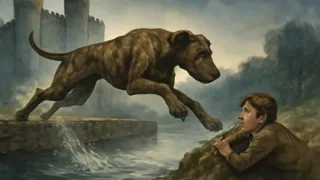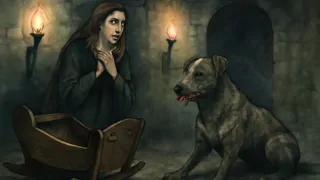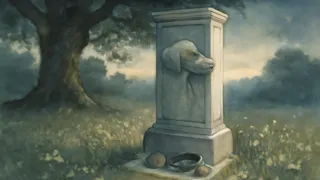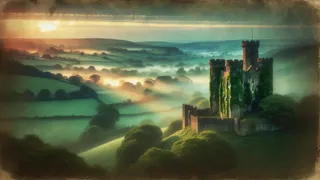Introduction
In the rolling green valleys of Gwynedd, where mist clung to mossy stones and rivers sang songs older than memory, stood the weathered keep of Lord Rhys, a fortress carved from granite that glowed at sunrise like embers against the sky. Inside these ancient walls, Lady Elinor welcomed a new guardian, a brindle hound of noble bearing she named Beth Gellert. From the first breath she drew, the pup’s dark eyes shone with curiosity, its tail a metronome of eager loyalty. Word of Beth’s gentle courage spread quickly through the courtyard—stablehands paused in their chores to watch her bound across dew-drenched turf, knights marveled as she followed each echoing footstep with unwavering devotion, and children in the adjacent hamlet whispered legends of how this hound might rival the heroes of old. For Elinor, the arrival of Beth brought comfort after seasons of longing. The lady had once known the sting of loss—a brother fallen in distant skirmishes, a husband lost to courtly intrigue, and a heart dulled by the whisper of regrets. Yet Beth’s bright yips at dusk, her soft breathing beside Elinor’s pillow, awakened something long buried: hope and the promise of companionship unbroken by fate’s cruel hand. Beneath the vaulted ceilings, tapestries depicted scenes of valor and grace—as though each thread wove destiny’s tapestry, hinting at stories yet untold. In the hush before dawn, when only the hush of wind against stone broke the silence, Elinor would rise and search for Beth in the shadows, finding comfort in the hound’s steady presence. She traced the gentle arc of those ears, felt the warmth of that fur, and whispered secrets of hopes to come. The air brimmed with expectancy, every fluttering torchlight promising new beginnings. Yet fate, ever fickle, rippled beneath these quiet moments like a hidden current, ready to pull them toward joy or despair. When Elinor first watched Beth chase a fox through the heather, her heart swelled with pride—never would she imagine that this same fierce instinct, this boundless devotion, would one day become a catalyst for the most terrible mistake of her life. That mistake would crown Beth not as a hero, but as a tragic symbol of innocence lost.
The Bond Forged in Loyalty
When Beth Gellert first set paw upon the courtyard’s flagstones, the castle guards halted mid-step, struck by the pup’s bright eyes and tentative curiosity. She was still small, her coat a swirl of brindle hues that seemed touched by forest shadows and dusk light. But her head lifted with the confident tilt of nobility, and her wagging tail carried a silent decree: I belong here. Lady Elinor, still weary from journeys across rugged passes, knelt before Beth and offered the hound her gloved hand. That simple act ignited a spark in the pup. From that day forward, Beth shadowed Elinor’s every move. When knights practiced sword drills on the courtyard parade, Beth sat stone-still, keenly watching each thrust and parry. When stable lads brushed down thoroughbreds, she curled at their feet, content to share their gentle murmurs. Tales of her unwavering composure traveled swiftly beyond the battlements, reaching the ears of the lord’s envoy, who declared that no guard had ever exhibited such calm obedience in the face of clashing steel. The hound’s legend began not with a heroic deed, but with unwavering presence: a silent sentinel with loyalty etched into every breath.

As winter’s breath painted frost upon the ivy-laden walls, Beth’s devotion proved no less steadfast. She waited patiently beside the hearth as Elinor penned letters to distant allies, her head resting on quilled parchment when the lady paused in her work. When the drawbridge creaked under the weight of supply wagons, Beth dashed to meet every newcomer, wagging her tail in greeting and inspecting wagons with bright intelligence. Even in the hush of midnight, when howling winds rattled arrow slits and candles guttered in golden jars, Beth would rise at Elinor’s soft whisper, her eyes glowing with readiness. Elinor found solace in that presence, a reminder that even the darkest hours held promise when met by faithful companionship.
Spring brought longer days and verdant fields draped in golden primrose. With each new sunrise, Beth’s lithe form matured, her muscles coiled like polished steel beneath a coat that shimmered in the sun. Elinor took her to the forest’s edge, where the hound learned to scale rocky ledges and cross babbling brooks without a murmur. Beneath ancient oaks, they practiced wordless commands: a raised hand, a soft whistle, a pause in pace. Beth responded with uncanny precision, her keen senses attuned to Elinor’s slightest shift in posture. Word spread among the hunters of Gwynedd that Lord Rhys’ hound had become peerless—a partner whose instincts rivaled the sharpest hawk. When morning mist clung to fern and heather, Beth darted through the underbrush, never once losing sight of her mistress, even when distant echoes of deer bells called out like distant stars. At the edge of that wild cathedral, the bond between hound and lady transcended simple obedience; it became a dance of trust, written in paw prints and whispered devotion. Even in laughter-filled taverns in the village below, patrons raised mugs to the tale of the lady and her noble hound, marveling at a friendship that seemed destined to withstand every trial.
Summer unfurled its warm embrace, and with it came the laughter of children at play around the castle ramparts. One afternoon, Elinor’s young nephew, a bright-eyed boy named Tomas, clambered onto the low wall to chase a red ribbon that danced on the breeze. A sudden misstep sent the ribbon tumbling over stones and into the yawning moat below. Without hesitation, Beth leapt over the narrow edge, her powerful legs slicing through air before plunging into dark water. The clang of steel and cries of alarm echoed from the courtyard as guards rushed forward, but it was Beth who reached Tomas first. She nudged him gently with her snout and guided him back toward the stone steps, her warm breath forming frosty clouds in the air. When Tomas coughed on the bank, pulling himself up with trembling hands, Beth shifted to stand protectively over him, her entire frame a shield of unwavering courage. The boy’s mother, who had seen only the final moment of rescue, clutched him close, tears of relief mingling with astonishment. In that instant, the story of Beth’s bravery became legend; songs were sung in mead halls of the hound who would risk her life for a child, a symbol of pure and selfless courage. Even Elinor, watching from a distance, felt her chest tighten with pride, knowing that loyalty ran through Beth’s veins like lifeblood.
As autumn weaved hues of amber and crimson into the forest canopy, Elinor and Beth set out on their final great journey. Rumors of strife in the borderlands had summoned the lord’s aid, and the pair rode eastward beneath banners that snapped against high winds. Whenever the terrain grew treacherous, Beth positioned herself between Elinor’s steed and hidden dangers: holes filled with brambles, jagged rocks lurking like silent sentinels, and stray arrows loosed by phantom archers cloaked in twilight. Each time, Beth’s keen instinct steered them clear, a living compass whose north was always set by devotion. At night, they camped under a vault of stars, Beth curled beside her mistress, ears tuned to rustles and howls beyond the flickering fire. Elinor felt invincible with the hound by her side, convinced that no force in the known world could sever their unspoken bond. Little did they know, destiny had woven darker threads into their tapestry; a single, tragic moment of misinterpretation would soon unravel everything they had built.
Shadows of Doubt and Despair
On a moonless night, when silver stars hid behind gathering clouds, the hush of the castle was shattered by Elinor’s anguished cry. Roused from slumber by the echo of clanging armor, guards raced along dimly lit corridors to find their lady by her child’s empty cradle. Beth Gellert sat at the foot of overturned spindle rails, her flanks heaving and her snout streaked with dark, sticky crimson. Candlelight trembled on the glossy curve of her coat as she lifted her head, eyes glassy with alarm and something deeper—an unwilling confession of unexplained guilt. Elinor’s heart constricted with terror; she reached out, voice trembling, to calm her loyal companion. But the sight of Beth’s bloody muzzle and the upturned crib twisted her resolve into a dagger’s point. Beneath the vaulted ceiling, torches sputtered as though struggling to bear witness to a sin they could scarcely understand. The guards, having secured the doors, waited with bated breath as Elinor knelt to search the shadowy corners of the chamber for any sign of the boy. Each heartbeat pounded like war drums, every moment stretched to an eternity of dread. When no cry answered her trembling calls, the lady’s soul teetered on the edge of the abyss. In that suffocating silence, loyalty itself seemed stained with suspicion. She traced trembling fingers along the cradle’s edge, desperate for proof that her nephew Tomas still breathed beneath the silken blankets. But all she found were drips of blood upon cotton—evidence, she feared, that Beth’s formidable jaws had wounded the child she vowed to protect. Shaking with a grief too profound for words, Elinor rose and fixed her gaze upon the hound that had never once betrayed her trust.

Fueled by raw emotion, Lord Rhys was summoned from the great hall. His armor rang with each authoritative step as he entered the chamber, his features etched by confusion and sorrow. He studied the tableau: the overturned cradle, the scattered straw, and Beth Gellert’s still form, eyes lowered as though burdened by unbearable guilt. Before any command could be spoken, a cry escaped from Elinor’s lips—a plea that Beth might yet hold an explanation in her steadfast heart. But Rhys, his spirit hardened by loss and the ruthless demands of leadership, saw only one recourse. In a motion swift and terrible, his gauntleted hand lifted a dagger from its sheath. The blade’s edge caught the low torchlight as he advanced, uttering a single word: "Justice." With a shaking breath, he plunged the dagger into the truth he refused to seek. Beth’s jarring yelp echoed like a rupture in reality, a sound so filled with pain that the torches flickered in sympathy. The hound staggered forward, muzzle falling open in a silent gasp, as crimson bloomed across her flank. Yet she did not flee. Instead, she lingered beneath Rhys’s shadow, as though to shield Elinor from a truth too shattering to behold. The guards looked on, torn between orders and horror, but none dared intervene as iron met living grace. Elinor’s hands flew to her cheeks, tears blazing hot against her skin, but she could not command her voice to halt the dagger’s terrible course. When the blade withdrew, Beth collapsed onto the cold stones, her eyes fixed upon Elinor’s despair. In the hush that followed, each breath felt like a wound, each heartbeat an indictment.
Only moments later, a faint, familiar cry pierced the grief-soaked air—a single, stifled sob that came not from the cradle, but from the dank recesses of the courtyard’s undercroft. Elinor stumbled from the chamber, shedding tears that mingled with guilt and disbelief. There, beneath a pile of furs and fallen hay, lay Tomas, wide-eyed but unharmed, clutching a trembling wrist already grazed by a savage foe. The creature responsible lay motionless at the edge of the storeroom—a wolf of uncanny size, its jaws locked in the remnants of fury, defeated at Beth’s unwavering side. Blood seeped from the hound’s final stand, staining armor and stone alike, yet her last breath unfurled in a soft whine of victory. Elinor fell to her knees beside Tomas, pressing his frail body to her chest as grief broke loose like a thunderous storm. Overhead, the stones of the keep seemed to weep, shards of torchlight dancing among arches as witness to the cruel turn of fate. Rhys stood rigid, his dagger still dripping, eyes haunted by the truth he had ignored. In that crushing moment, loyalty and love collided, leaving regret carved into every heart.
Days later, a silent funeral passed beyond the drawbridge, chased by mourners whose faces were blazed by sorrow. Beth’s remains lay beneath an ancient oak at the edge of the forest—a place where dawn’s first light would fall upon a modest stone inscribed with her name: 'Beth Gellert, Protector, Friend, Hero.' Elinor planted a single white rose beside the marker and vowed never to let forget the hound whose life was a testament to pure devotion. Each night, she lit a candle at the foot of the oak and whispered apologies into the wind, carried by hooting owls and rustling leaves. In the hearth lit by memory and loss, the bond between lady and hound transformed into legend. Across villages and hamlets, bards sang of the faithful guardian felled by hasty justice, and parents told the tale to weary children, urging them to listen before they condemn. Thus did Beth Gellert’s tragedy become a beacon of moral clarity: a solemn lesson that love can transcend doubt, yet even the noblest intent can shatter under the blade of suspicion.
Generations have since passed, and castle walls have crumbled into scattered stones, yet the name of Beth Gellert endures. Travelers pause near the weathered oak, leaving tokens of gratitude—knotted ribbons, polished bones, or flickering lanterns. Beneath that silent canopy, one can almost hear the soft pant of devoted paws and the rustle of a hound’s loyalty echoing across time. And though Beth’s voice has grown distant, her spirit remains, teaching all who listen that truth demands patience, and that sometimes, love itself walks a path fraught with peril.
The Echo of Remorse and the Legacy of a True Friend
In the days that followed Beth Gellert’s untimely end, a quiet gloom settled over the castle halls as heavy as winter’s shade. Lady Elinor moved through chambers draped in mourning, her once vibrant laughter stilled by the weight of remorse. Each step echoed with the memory of Beth’s soft paws on flagstones, and every corner bore witness to the hound’s gentle vigilance. When morning light slanted through stained glass, she would pause at the dog’s empty resting place, fingertips brushing cold stones where they had once shared whispered confidences in the hush before dawn. The gifts Beth had so loyally carried—Elinor’s letters, small trinkets, and even her hopes—lay untouched by time, reminders that a single moment of confusion could eclipse a lifetime of devotion. Rumors of the tragedy seeped into neighboring lands, carried by traders and minstrels whose songs painted scenes of a noble hound betrayed by cruel misunderstanding. Yet Elinor found solace only in one truth: Beth’s sacrifice had saved young Tomas, whose laughter returned like sunlight but could never replace the void left by a faith so wrongfully fractured. With each breath, Elinor resolved to honor Beth’s legacy, to ensure that no creature’s fidelity would again be stained by hasty judgement. In that vow lay the seed of a memorial that would outlast stone and memory. She began to collect the scattered verses of poets who had sung of the hound’s bravery, weaving them into a tapestry of words that spanned both sorrow and gratitude.

Elinor commissioned stonemasons to carve a pillar from pale marble, its surface polished until it gleamed in sunlight like a drop of dew upon a rose. Atop the pillar, she ordered a sculpted likeness of Beth Gellert—ears pricked in eternal attention, head bowed in humble grace. Inscribed beneath were words not of blame, but of tribute: 'To Beth Gellert, Protector of Innocents, whose loyalty knew no bounds, this monument stands as witness to devotion unbroken by doubt.' Pilgrims traveled from distant shires to stand before the pillar, laying garlands of wildflowers or placing coins at its base in silent reverence. Upon reaching the crest of the hill, many claimed to feel a warmth in the breeze or hear a faint, comforting lyric—like the gentle pant of a devoted friend just beyond the veil of mortality. Even Tomas, now grown and bearing his aunt’s gentle features, would return at midsummer to leave ribbons in Beth’s brown and gold colors, each tied in a loop that spoke of unending remembrance. Below the hill, bards composed ballads that wove Beth’s story into the tapestry of local myth, ensuring that children would learn of her steadfast heart before they spoke their first words. Priests offered prayers at dawn for a loyal soul, and merchants minted small tokens in the shape of a hound’s paw, charms meant to ward off misfortune. In every echo of the marketplace’s bustle, a whisper of Beth’s devotion endured—a reminder that true friendship lives on long after the final heartbeat of the body. For Elinor, the pillar grew to symbolize both an end and a beginning: the end of suffering for a soul too pure in intention, and the beginning of a legacy no blade of doubt could ever erase.
Over generations, the tale of Beth Gellert wove itself into the fabric of Welsh tradition, carried from hearth to hearth in gatherings beneath ringed stone circles and flickering hearthside embers. Mothers cradled babes telling how a hound’s instinct saved a child while a moment’s misjudgment led to the greatest sacrifice of all. The moral settled deep in every listener’s soul: watch closely before you condemn, for appearances can deceive, and within the heart of the accused may beat the very spirit of heroism. Scholars in distant abbeys recorded the verses, ensuring that Beth’s story would endure beyond the fragile confines of oral history. Traders from the coast spoke of a hound’s paw chiseled in temple doorways, a symbol so powerful that even travelers unversed in Welsh could sense its reverence. The world beyond Gwynedd began to absorb the wisdom of Beth’s fate: that loyalty is a gift to cherish, and that freedom to love without fear requires both trust and understanding.
Centuries have passed, and the castle at Gwynedd has given way to rolling farmland where poppies nod in the breeze. The marble pillar, touched by soft moss and gentle rain, remains steadfast at dawn’s first light. In modern times, travelers leave flowers and trinkets not out of duty but out of genuine gratitude for a lesson so timeless that it transcends the ages. Animal lovers gather each year at the hilltop, their voices blending in choral remembrance of a single hound whose heart held more truth than any blade of judgement. And though Beth’s voice has drifted into legend, her spirit continues to guide those who wander through doubt’s shadow, teaching that before guilt can be claimed, the full measure of devotion must be seen. Local historians still guide visitors up the winding path, recounting the story of Lady Elinor and her beloved companion with tears in their eyes and respect in their tone. Poets pen new verses in multiple tongues, inspired by a creature who could not speak but taught a language of trust more haunting than sorrow itself. And at every telling, the silence that follows is never empty; in that quiet, one can almost feel Beth’s presence at the threshold of memory, urging all to look deeper, to question harsher truths, and to cherish the loyalty that stands ever ready to sacrifice all.
Today, in a land shaped by modern roads and distant hum of progress, the hill remains a quiet sanctuary. Couples come to pledge their vows beside the old oak, their whispered promises echoing through time like a fresh chapter in Beth’s saga. Children chase each other through the wildflowers, unaware of the hound’s silent watch but feeling, somehow, the warmth of that ancient devotion in their laughter. Scholars continue to debate the nuances of the tale—was Beth guided by instinct, or by a deeper bond that defies mortal definition? But for most who stand beneath the oak’s dappled shade, questions fade against the certainty of something bigger than human error or fate’s cruelty. They sense a presence that silently proclaims: 'Trust, for in trust lies the power to both save and to destroy, but above all, to transform.'
Conclusion
Beth Gellert’s story endures as a poignant reminder of the fragile boundary between trust and suspicion. In her unwavering loyalty, we see a reflection of the purest intentions, a sacrifice born from devotion so profound that no misinterpretation could alter its core. Yet the tragedy of her demise warns us that even the brightest bonds can shatter in a breath of fear, reminding us to pause, to seek truth beyond the veil of appearances, and to listen with compassion before passing judgement. Across rolling Welsh hills and distant lands, the oak and its marble guardian stand as silent witnesses to the power of forgiveness and the enduring legacy of a faithful heart. May we honor Beth’s memory by embracing understanding in the face of uncertainty, cherishing the companions who walk beside us, and remembering that true loyalty need not wear the stain of doubt to shine its guiding light through the darkest of nights. Each ribbon tied, each token placed at the base of her pillar, pulses with gratitude for a friendship that transcends time. Though her voice has fallen silent, the echo of her devotion reverberates through generations, urging us to live with gentleness, to judge with humility, and to love without reservation. May her story guide the youngest and oldest alike, a testament that compassion and trust, once kindled, can forge a light powerful enough to dispel the deepest shadows of doubt.


















